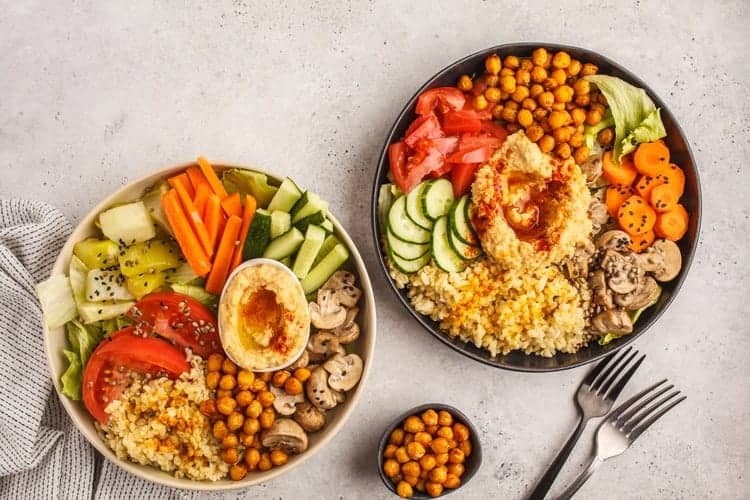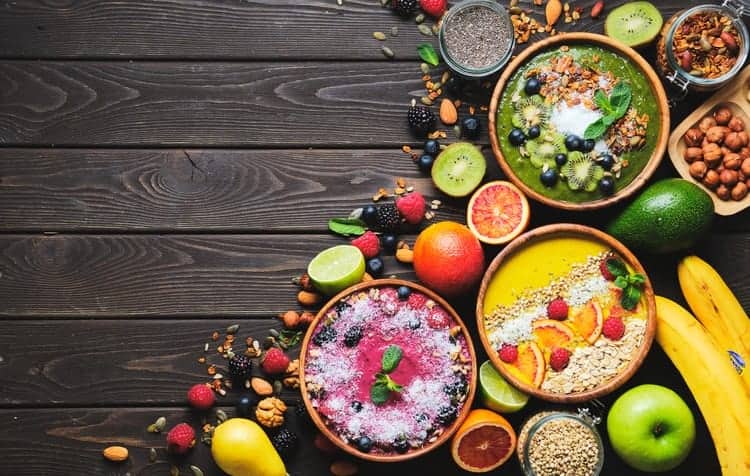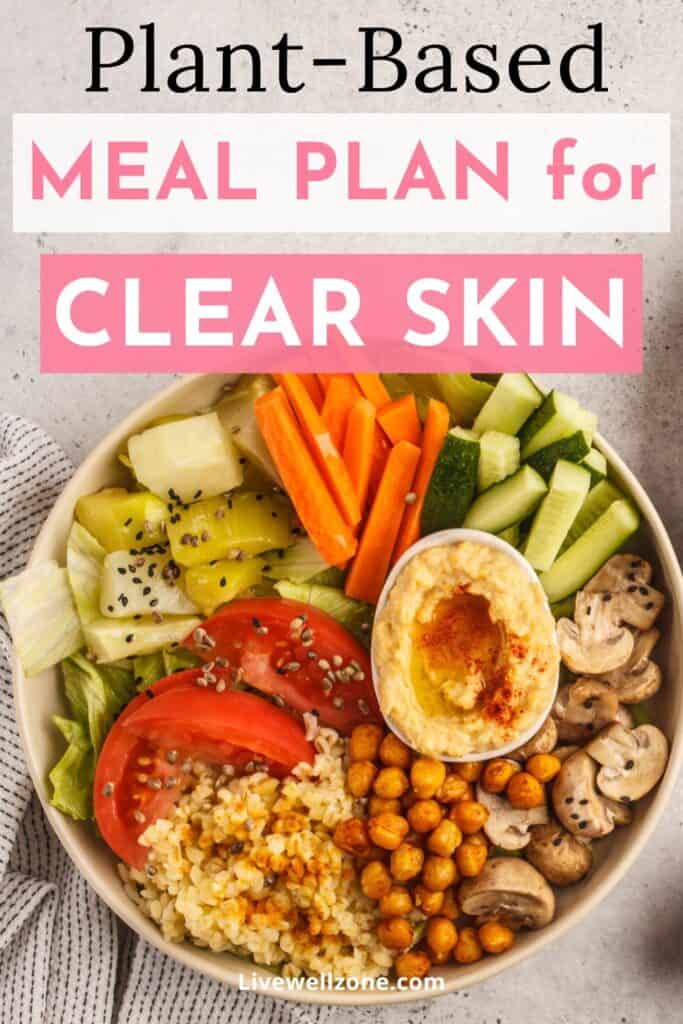
A plant-rich diet – such as a vegan or vegetarian diet – can play a major role in improving inflammatory conditions such as acne, as well as giving your a healthier appearance overall. So in this article, I’m going to be sharing what a sample vegan meal plan for clear skin looks like, as well as:
- what research has to say about the link between diet and skin conditions like acne, eczema and more.
- tips for ensuring that you’re getting all the nutrients that you need for glowing skin.
SAMPLE VEGAN & VEGETARIAN DIET PLAN FOR CLEAR SKIN
NOTE: this section used to have a sample selection of recipes to download. I’ve updated it so that you no longer need to download anything. Instead, I’ve included a list of recipes from other amazing bloggers that you can use immediately.
This sample plant-based plan for skin features recipes for breakfast, lunch, dinner and snacks that you can mix and match as you wish.
BREAKFAST RECIPES:
- Peanut Butter Overnight Oats: this 5-ingredient recipe is an easy and delicious start to your day. Get the recipe here from The Minimalist Baker.
- Blueberry Green Detox Smoothie: this smoothie uses blueberries, bananas, spinach and hemp seeds to nourish your skin from the inside out. Get it here.
MID-MORNING SNACK: Hummus (with sliced veggies)
- Homemade Hummus: this is a great-tasting hummus recipe and it outshines every store brand I’ve tried. Excellent dip for carrots or celery. Get the recipe here at Rainbow Plant Life.
LUNCH: Buddha Bowl
- Best Buddha Bowl: this colorful buddha bowl features chickpeas, sweet potatoes, microgreens and plenty of other goodness for your skin. Get the recipe here at Love and Lemons.
MID-AFTERNOON SNACK: Coconut yogurt (plus your favorite toppings)
Over at Vegetarian Gastronomy, they’ve made this list of 6 yogurt topping ideas that you can use to make a quick and healthy snack.
DINNER: Citrusy Kale & Carrot Salad
- 15-Minute Cauliflower Fried Rice: whip up a delicious dinner in just a few minutes with this recipe from Pinch of Yum.
DOES BEING VEGAN CLEAR YOUR SKIN?

Although there isn’t much research on how veganism affects acne, there is research indicating that a mostly plant-based diet is very helpful for increasing the body’s antioxidant activity and lowering inflammation. Since acne is an inflammatory condition, it’s possible that a nutritionally balanced vegan diet could improve the skin.
Now, if you’re thinking “isn’t plant-based the same as vegan?” Well, it depends on who you ask 🙂
Personally, I define plant-based as a diet that consists mostly of plants, with a sprinkle of animal products here and there. The research papers that I cite in this article also use a similar definition. But there are other people for whom plant-based means vegan.
Now, here are some of the ways in which a whole food, plant-based diet may improve acne and overall skin health (1, 2, 3, 4, 5, 6, 7, 8, 9):
- Lowers Insulin and IGF1 (insulin-like growth factor 1): dairy products such as cow’s milk contain whey protein (which elevates insulin) and casein (which leads to high IGF-1 levels). Increased insulin and IGF1 are linked to the development of acne. By consuming a plant-based diet, acne patients are able to improve both of these hormones.
- Less skin inflammation: nuts and seeds contain various fatty acids that support the skin. For example, alpha-linoleic acid (which is abundant in seeds like flax and pumpkin) improves dryness and skin atrophy (thinning of the dermis) in middle-aged women. In addition, a diet that is low in ALA is linked to dermatitis (the general term for skin inflammation, including conditions like eczema).
- Lower glycemic load: different studies have shown that people with acne tend to eat foods with a high glycemic index and a high glycemic load. Since whole, plant foods are usually lower on the glycemic scale, they can help to stop the development and progression of inflammatory skin conditions like acne. NOTE: this doesn’t mean that you have to stress out and totally avoid stuff considered high glycemic. It’s more about having a better balance in your diet.
- Increased antioxidant activity: plant foods have about 64 times more antioxidants than animal foods. This means that a diet that is very high in vegetables, fruits and other plant foods will help to protect the skin from oxidative damage (which contributes to acne, premature aging and inflammatory skin conditions).
These are just a few of the many ways in which a plant-rich diet can transform the skin. There’s a lot more research that’s been done around diet and acne. I’ve linked to many studies and review papers above. Feel free to use them to dig deeper into this rich fascinating topic!
VEGAN FOODS TO AVOID FOR BLEMISH-FREE SKIN
The one thing that turns a vegan diet from friend to foe is packaged and highly processed foods, aka “vegan junk food.” And unfortunately, there is no shortage of these foods on the market.
Whether it’s cookies, chips, vegan burgers or vegan sausage, there’s something out there to grab your attention.
While many of these “food-like products” – such as the vegan meats – are intended to ease the transition to a plant-based lifestyle, they can still contain synthetic food coloring, natural flavors (which is a broad term for different artificial chemicals), synthetic preservatives and other unwholesome ingredients.
The point of all this is: the more a food has been processed and preserved, the more it is likely to contain some harmful components.
So, it’s important to prepare your own meals. That’s the best way to have more control over the nourishment that your skin receives.
Lastly, it’s a good idea to minimize consumption of – and in some cases, totally avoid – common allergens such as:
- gluten.
- GMO corn.
- GMO and unfermented soy products.
- non-organic dairy.
ADDITIONAL TIPS FOR BOOSTING YOUR PLANT-BASED, SKIN-CLEARING MEAL PLAN
- Supplement with a good multivitamin: a balanced, nutritionally diverse diet is a must for bringing down the inflammation that contributes to acne. However, for various reasons – maybe the food you’re buying wasn’t well grown or you’re not eating enough variety of food – you may not be getting all the nutrients you need. In this case, a quality multivitamin can help you reach your daily nutritional needs.
- Add a B-12 supplement to your menu: a 2003 study found that 77% of ovo and lacto vegetarians who did not use supplements were deficient in B12. That same study showed that 92% of vegans who did not supplement had a B12 deficiency. So, taking a B12 only supplement can help to fill in the gap. Also, B12-containing foods – such as tempeh, mushrooms and seaweed – should be a regular part of your diet.
- Don’t skimp on fatty acids: our bodies need EPA (eicosapentaenoic acid) and DHA (docosahexaenoic acid) to fight inflammation and support other chemical processes. However, if you’re vegan, or a vegetarian who avoids fish, then you may be deficient in these nutrients. So, you can either eat more (it’s one of the few plants that has DHA) and/or take an omega-3 supplement that is derived from seaweed.
- Maintain healthy vitamin D levels: Through the years, researchers have discovered that vitamin D is an antioxidant, anti-comedogenic and an immune system regulator. In addition, research also shows that vitamin D deficiency is more common in acne patients (source). While this doesn’t establish a cause and effect relationship, it’s important to ensure that you have sufficient vitamin D. You can do this either by getting daily sun exposure and/or taking a vitamin D supplement.
CONCLUSION
In order to successfully clear up your skin with a vegan diet, it must be nutritionally balanced, contain mostly whole foods and be free of any items that you are allergic to.
I hope that the tips and research provided in this article have helped you to get a better idea of what a skin-friendly vegan (and vegetarian) diet can look like.

You Might Also Enjoy:
10 Healthy Homemade Drinks for Clear Skin (that you need to know!)
How Much Water Should I Drink To Clear Acne? The Answer May Surprise You
Why Is My Skin Bad When I Eat Healthy? 8 Things You Might Be Ignoring and What to Do About Them
How To Make The Best Anti Acne Smoothie (and Give Your Skin New Life)
Peppermint Tea vs Spearmint Tea for Acne: Which Is Better?

